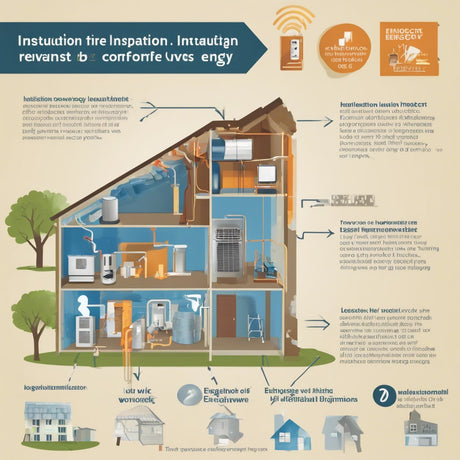- No products in the cart.
The Role of HVAC Insulation in Energy Efficiency
26
Mar
Heating, ventilation, and air conditioning (HVAC) systems are essential components of modern buildings, providing comfort and indoor air quality to occupants throughout the year. However, these systems can also be significant energy consumers, accounting for a considerable portion of a building's energy usage. One crucial factor that can greatly impact the energy efficiency of an HVAC system is insulation. Proper insulation not only helps maintain desired indoor temperatures but also reduces energy consumption and utility costs. Let's delve into the role of HVAC insulation in enhancing energy efficiency and its importance in sustainable building design.
Understanding HVAC Insulation
HVAC insulation refers to materials or systems used to reduce heat transfer between the conditioned indoor spaces and the external environment. It is applied to various components of HVAC systems, including ductwork, pipes, and equipment, to minimize heat gain or loss and ensure optimal thermal performance.
The Importance of HVAC Insulation in Energy Efficiency
-
Reduced Heat Loss and Gain: Insulation acts as a barrier that inhibits the transfer of heat between different spaces. In heating mode, it prevents heat from escaping the system, thereby reducing energy consumption required to maintain indoor comfort. Similarly, in cooling mode, insulation helps prevent heat from infiltrating the conditioned space, allowing the HVAC system to operate more efficiently.
-
Improved System Performance: Well-insulated HVAC components, such as ductwork and pipes, experience less thermal variation, resulting in more consistent temperatures throughout the building. This not only enhances occupant comfort but also improves the overall performance and reliability of the HVAC system.
-
Lower Energy Bills: By minimizing heat transfer, HVAC insulation reduces the workload on heating and cooling equipment, leading to lower energy consumption and utility bills. Buildings with properly insulated HVAC systems typically experience significant cost savings over time, making insulation a worthwhile investment for both residential and commercial properties.
-
Enhanced Indoor Air Quality: In addition to thermal benefits, HVAC insulation can also contribute to better indoor air quality by preventing moisture condensation and mold growth. Moisture-resistant insulation materials help maintain a dry and healthy indoor environment, reducing the risk of respiratory problems and other health issues associated with poor indoor air quality.
-
Environmental Sustainability: By reducing energy consumption and greenhouse gas emissions associated with heating and cooling, HVAC insulation plays a crucial role in promoting environmental sustainability. Energy-efficient buildings contribute to lower carbon footprints and help mitigate the impacts of climate change.
Choosing the Right Insulation Materials
When selecting insulation materials for HVAC systems, several factors should be considered, including thermal performance, durability, moisture resistance, and compatibility with existing components. Common insulation materials used in HVAC applications include fiberglass, foam board, mineral wool, and reflective foil. The choice of insulation material depends on specific requirements such as space constraints, temperature range, and environmental conditions.
Conclusion
HVAC insulation is a key determinant of energy efficiency in buildings, significantly impacting both energy consumption and indoor comfort levels. By reducing heat loss and gain, improving system performance, and lowering energy bills, proper insulation contributes to sustainable building design and operation. Building owners, designers, and HVAC professionals should prioritize insulation as an integral part of HVAC system design and maintenance to maximize energy efficiency and achieve long-term cost savings. As the demand for energy-efficient buildings continues to grow, investing in high-quality HVAC insulation becomes increasingly important for creating comfortable, healthy, and sustainable indoor environments.













